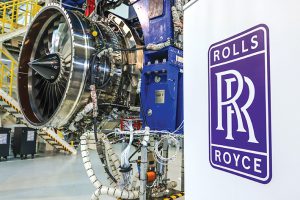BLOOMBERG
Rolls-Royce Holdings Plc set ambitious medium-term targets of higher cash flow and return on capital as Chief Executive Officer Tufan Erginbilgic takes his turnaround effort at the UK engine maker to the next phase.
The company expects to achieve operating profit of as much as £2.8 billion ($3.5 billion) and free cash flow of as much as £3.1 billion by 2027 — more than triple the amount set for this year. Return on capital will be as high as 18% by then, it said in a stock exchange filing ahead of a meeting with investors and analysts.
The manufacturer will also look to divest assets that don’t meet profitability goals and continue a saving push that will generate as much as £500 million in the mid-term.
“We’re looking to recreate a new Rolls-Royce which is high performing, competitive, resilient, and a growing company,” Erginbilgic said on a media call. “We’ll unlock our full potential as we translate engineering excellence into strong financial performance.”
Erginbilgic has embarked on an extensive overhaul of the prime UK manufacturer, which he described as a “burning platform” shortly after taking over at the start of this year. The company has said it plans to cut as many as 2,500 jobs, or 6% of worldwide workforce, as the CEO presses ahead with his effort to streamline operations and boost profitability.
The former BP Plc executive has taken a much tougher approach to pricing as Rolls-Royce focuses on profit instead of offering steep discounts to win business. That’s led to some missed sales opportunities — and tension with partner Airbus SE, which relies exclusively on the company’s turbines for its widebody jets. The company expects free cash flow to reach as much as £1 billion in 2023.
Narrowbody Return
Those strains were on display at the recently concluded Dubai Air Show, where Airbus failed to secure a major order from local carrier Emirates for the biggest variant of the A350 widebody. The airline’s president, Tim Clark, was looking for as many as 50 A350-1000s, but settled for a 15-plane deal for the smaller A350-900 instead. He called the larger model “defective” because of what he said are overly frequent maintenance cycles on the engines, as the negotiations played out publicly during the show.
Rolls-Royce said that it’s “well positioned” to re-enter the lucrative market for narrowbody aircraft, by far the most widely flown category in commercial aviation, after leaving a partnership for engines on the Airbus A320 model more than a decade ago. The company would do so again via a partnership, most likely leveraging its so-called Ultrafan technology for the next-generation engine, it said. The company is targeting the next generation of narrowbody and widebody aircraft, that will enter into service around 2035 for the Ultrafan equipped engines, Erginbilgic said.
Over a longer term, Rolls-Royce’s performance has lagged its peers because it rang up deals that sacrificed up-front cash in favour of market share, according to Nick Cunningham, an analyst at Agency Partners.
The fact that the company is now willing to put profitability over market share would imply a “deeper cultural change” at Rolls-Royce as it moves away from “market share optimisation approach of past decades,” he wrote in a note.
Divestments
Rolls-Royce said it can achieve the biggest performance swing at its civil engine business, by focusing on improvements as better contracts, lower maintenance and product costs. As part of its savings push, Rolls-Royce said it would seek to exit its electrical business that makes powerplants for aircraft electrification such as flying taxis, unit in the “short term”.
“We believe, given the world-class capability we have built in advanced air mobility, that this will represent good value to a third party and will allow us to focus on our core electrical engineering activities in power systems, defence and civil aerospace,” the company said.
In 2018, Rolls-Royce set a mid-term target of achieving more than £1 billion ($1.26 billion) in free cash flow by 2020. That forecast was upended by issues with its Trent 1000 engine, used on Boeing Co’s 787 Dreamliner, and the Covid-19 pandemic, which decimated air travel and forced the company to cut thousands of jobs.
 The Gulf Time Newspaper One of the finest business newspapers in the UAE brought to you by our professional writers and editors.
The Gulf Time Newspaper One of the finest business newspapers in the UAE brought to you by our professional writers and editors.
